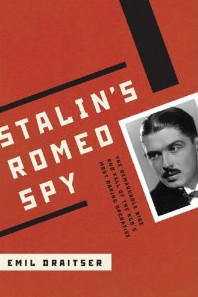Kosher Bookworm: Stalin’s Romeo Spy for May Day
Following on the heels of Pesach, a holiday celebrating the cause of freedom, we have this weekend May Day, a holiday that celebrates the virtues of totalitarianism and murder.
May Day, was originally symbolic of idealism. However, as with any social ideal that becomes the instrument of tyranny, it too morphs into a commemorative to tyranny’s cause. One personality who personified that ideal gone wrong was Soviet spy Dmitri Bystrolyotov who served in communism’s cause and lived to be both persecuted by it, and eventually survived and avenged that persecution.
In a riveting book, “Stalin’s Romeo Spy,” published by Northwestern University Press, Hunter College professor of Russian, Emil Draitser details the sordid and dramatic events of the escapades of Bystrolytov’s life of spying, imprisonment and eventual spilling of the beans concerning communist duplicity. Not Jewish himself, Bystrolyotov’s life dove tails with Jewish experiences and personalities thus making this book a worthwhile read for those who have interest in the causes of Soviet Jewry as well as general Jewish history.
According to Draitser, “Bystrolyotov was part of an intelligence network driven by idealists devoted to the cause of social justice for all. It was natural that, deprived of equal rights in Russian society, under czarism, many Jews took part in it. In fact, from the very moment of its organization the Soviet foreign intelligence service was headed by Jews, first Solomon Mogilevsky and then Meir Trilliser… Bystrolyotov also worked shoulder to shoulder with many Jewish operatives among them Abram Slutsky, chief of the Foreign Service department.”
While spying in the west he did his most effective super spy activities, as detailed in this book. This reflected his most productive espionage work on behalf of his communist masters. Nevertheless, these activities were not to save him from the fate of others who incurred the paranoid wrath of Stalin and his Marxist cohorts.
It was during the infamous Stalin purges that Bystrolyotov’s career came to an end.
Draitser goes into to great detail concerning this era. “After he refused to cooperate with his jailers by self-incriminating himself, he was given an ultimatum. His choice was to write his testimony ‘either in ink or his own blood’. Tormented as to what to do he polled many fellow inmates until he came across one, a middle-aged Jewish communist whose judgment, a strange mixture of religious and communist consciousness, he finally embraced.
“That Jewish prisoner told him in unequivocal terms that since spying abroad inevitably involved violation of the tenets of morality, he should accept torture as part of his atonement for his wrongdoings even though he did it trying to promote the idea of happiness for all humanity.’
Ironically, it was that same prisoner who admitted to the evil that was at the base of communist ideology and the Soviet state. This fact was impressed upon Bystrolyotov and was a lesson he never forgot. Although he suffered most during his imprisonment, he was much more fortunate than some others. He survived the Gulag while Trilliser was to be executed and Slutsky was to be poisoned by lethal injection.
Bystrolyotov wrote in his memoirs while still in the Gulag words that could bring him more trouble stating that anti-Semitic actions showed the whole world that communism and Nazism are all the same, that the Nazis and the communists recognized each other ‘by smell.’
For too long many among in our community were blind to communist bigotry against our people and hostility toward our faith. A good reading of this book would go a long way toward correcting this misapprehension.

 64.0°,
A Few Clouds
64.0°,
A Few Clouds 




